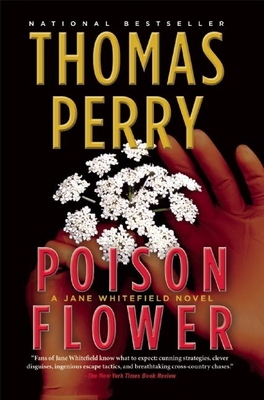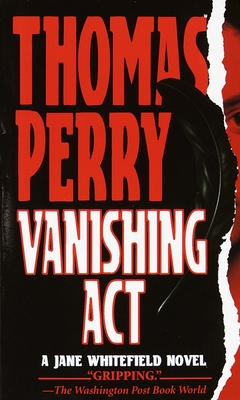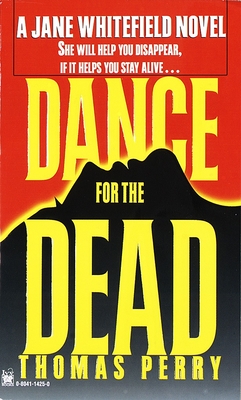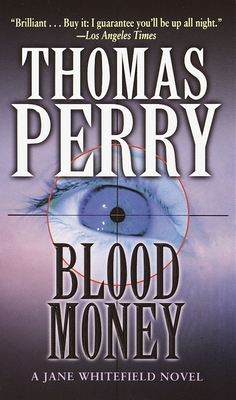Poison Flower, the seventh novel in
Thomas Perry’s celebrated Jane Whitefield series, opens as Jane spirits
James Shelby, a man unjustly convicted of his wife’s murder, out of the
heavily guarded criminal court building in downtown Los Angeles. But the
price of Shelby’s freedom is high. Within minutes, men posing as police
officers kidnap Jane and, when she tries to escape, shoot her.
Jane’s captors are employees of the man who really killed Shelby’s wife. He believes he won’t be safe until Shelby is dead, and his men will do anything to force Jane to reveal Shelby’s hiding place. But Jane endures their torment, and is willing to die rather than betray Shelby. Jane manages to escape but she is alone, wounded, thousands of miles from home with no money and no identification, hunted by the police as well as her captors. She must rejoin Shelby, reach his sister before the hunters do, and get them both to safety.
In this unrelenting, breathtaking cross-country battle, Jane survives by relying on the traditions of her Seneca ancestors. When at last Jane turns to fight, her enemies face a cunning and ferocious warrior who has one weapon that they don’t.
Hank says:
"I have followed the story of Perry's character Jane Whitefield since receiving a promotional copy of the first novel, Vanishing Act. Four more books in succession fulfilled a contract, and he went on to write other books, so now it's a treat when he decides he has something more to tell us about Jane's life. She's unlike any other thriller protagonist I've ever encountered, relying on the guiding skills of her Seneca heritage to assist people in trouble, and help them disappear from their pursuers into new, safer lives. Paradoxically, this puts her own life in great danger, and while she would now prefer to disappear into her own settled, happily married life for a number of years, once in awhile a situation arises in which she feels compelled to come out of retirement.
In Poison Flower, Jane helps a wrongly convicted man escape from a courthouse appearance, and the chase is on! Perry ratchets up the sense of peril beyond any previous level, and there's a nasty "reunion" with various characters from other novels who've underestimated her, and are ready for revenge. For that reason, I wouldn't recommend starting with Poison Flower, but preferably with Vanishing Act, and continuing in series order. Jane ages in real time with each book, so she's quite a bit older now than when we first met her. People talk about magical realism in literature, and I would make the distinction that Jane's worldview includes more of a mystical realism, as she draws on her Seneca traditions to counteract the otherwise harsh and gritty scenarios she negotiates.
People who enjoy C.J. Box's fast-paced suspense will probably enjoy Jane's narrative."
The First Six, In Order:
Jane’s captors are employees of the man who really killed Shelby’s wife. He believes he won’t be safe until Shelby is dead, and his men will do anything to force Jane to reveal Shelby’s hiding place. But Jane endures their torment, and is willing to die rather than betray Shelby. Jane manages to escape but she is alone, wounded, thousands of miles from home with no money and no identification, hunted by the police as well as her captors. She must rejoin Shelby, reach his sister before the hunters do, and get them both to safety.
In this unrelenting, breathtaking cross-country battle, Jane survives by relying on the traditions of her Seneca ancestors. When at last Jane turns to fight, her enemies face a cunning and ferocious warrior who has one weapon that they don’t.
Hank says:
"I have followed the story of Perry's character Jane Whitefield since receiving a promotional copy of the first novel, Vanishing Act. Four more books in succession fulfilled a contract, and he went on to write other books, so now it's a treat when he decides he has something more to tell us about Jane's life. She's unlike any other thriller protagonist I've ever encountered, relying on the guiding skills of her Seneca heritage to assist people in trouble, and help them disappear from their pursuers into new, safer lives. Paradoxically, this puts her own life in great danger, and while she would now prefer to disappear into her own settled, happily married life for a number of years, once in awhile a situation arises in which she feels compelled to come out of retirement.
In Poison Flower, Jane helps a wrongly convicted man escape from a courthouse appearance, and the chase is on! Perry ratchets up the sense of peril beyond any previous level, and there's a nasty "reunion" with various characters from other novels who've underestimated her, and are ready for revenge. For that reason, I wouldn't recommend starting with Poison Flower, but preferably with Vanishing Act, and continuing in series order. Jane ages in real time with each book, so she's quite a bit older now than when we first met her. People talk about magical realism in literature, and I would make the distinction that Jane's worldview includes more of a mystical realism, as she draws on her Seneca traditions to counteract the otherwise harsh and gritty scenarios she negotiates.
People who enjoy C.J. Box's fast-paced suspense will probably enjoy Jane's narrative."
The First Six, In Order:







No comments:
Post a Comment